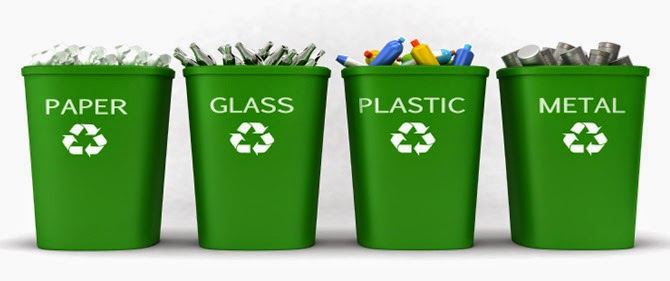A Look at the Recycling Process
Did you ever think of what happens to the things (objects) that you throw into the recycling canisters? Here's a glance at how glass, plastic, and paper are put through the recycling process.
Glass
Glass has been used by people for as long as 3,000 years ago. Glass was used by ancient Egyptians to make cups, jewellery, and many other items. Glass is created of soda ash, limestone, and sand. Glass is amongst one of the easiest thing to recycle. This is how Glass is recycled.
 |
| Glass gathered together, outside the recycling center |
- The used glass is brought to recycling centers.
- The glass is arranged and separated according to color at recycling centers.
- The glass is transported to a preparing office where it is cleaned and squashed into cullets.
- The cullet is brought to an assembling plant and blended with more pop slag, sand, and limestone.
- The mixture is warmed in a heater as well as transformed into a fluid.
- The fluid is then put into molds and formed into new items.
 |
| Water bottles are made of plastic |
Plastic
Not at all like glass, which is made completely of regular minerals and substances. Plastic is made out of crude and man made materials, including the likes crude oil and petroleum. Here's the means by which plastic is recycled.
- The used plastics are brought to a recycling center.
- The plastic goes to a recycling plant where it is assessed and washed.
- The recyclable plastic is washed and hacked into little chips.
- The chips are differentiated in a flotation tank.
- The chips are dried and after that dissolved into a fluid.
- The fluid is put through a scanner screen for additional cleaning. It turns into lengthily strands.
- The strands are cooled and cut and become hail like pellets.
- Then they go to producers and manufacturers who use them to make new items.
Paper
Tiny fibers is what makes up paper. Since these fibers is what makes up paper than means it can only be recycled a certain amount of times. The reason why paper cannot be recycled many times is because the fiber eventually becomes weak. Almost all forms of paper can be recycled, but glossy or waxy coating types of paper don't get recycled, because they are too expensive to recycle. When considering to recycle paper, you should try to separate white paper, news print, and cardboard. Here’s an in depth analysis of the process of recycling paper.
 |
| Tractor taking piles of Paper to get recycled |
- Take the paper to the recycling center.
- The paper is sorted and transported to a pulping office.
- The paper is absorbed and warmed colossal vats, getting to be mash. Chemicals in the fluid separate the ink from the paper.
- The mash is screened and cleaned to evacuate paste, different garbage and any remaining ink.
- The mash is refined and beaten to make it prepared to wind up paper once more.
- The mash is nourished into a machine that releases the mash onto a level moving screen where it structures sheets.
- The sheets are moved and dried and prepared for their new life.
Please fill out the recycling survey here, so that we can gain feedback about how you recycle











